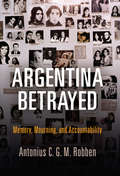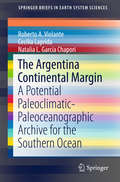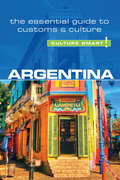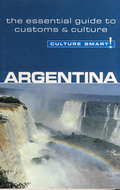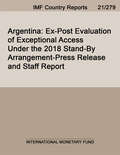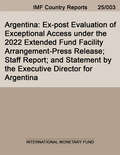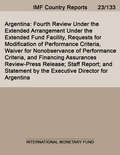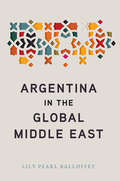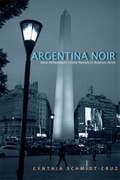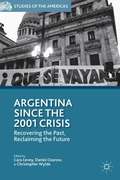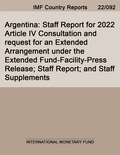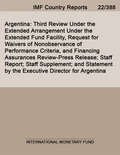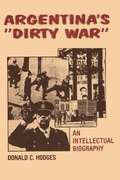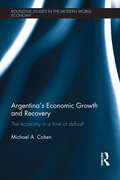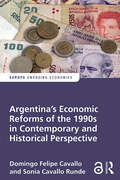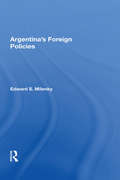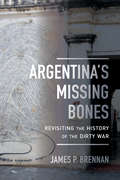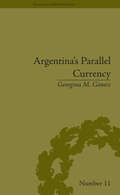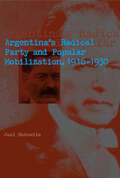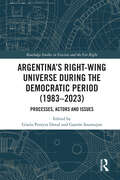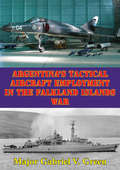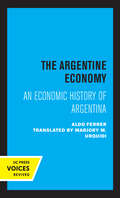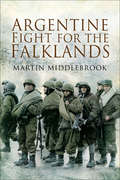- Table View
- List View
Argentina Betrayed: Memory, Mourning, and Accountability (Pennsylvania Studies in Human Rights)
by Antonius C. Robben<p>The ruthless military dictatorship that ruled Argentina between 1976 and 1983 betrayed the country's people, presiding over massive disappearances of its citizenry and, in the process, destroying the state's trustworthiness as the guardian of safety and well-being. Desperate relatives risked their lives to find the disappeared, and one group of mothers defied the repressive regime with weekly protests at the Plaza de Mayo in Buenos Aires. How do societies cope with human losses and sociocultural traumas in the aftermath of such instances of political violence and state terror? <p>In <i>Argentina Betrayed</i>, Antonius C. G. M. Robben demonstrates that the dynamics of trust and betrayal that convulsed Argentina during the dictatorship did not end when democracy returned but rather persisted in confrontations over issues such as the truth about the disappearances, the commemoration of the past, and the guilt and accountability of perpetrators. Successive governments failed to resolve these debates because of erratic policies made under pressure from both military and human rights groups. Mutual mistrust between the state, retired officers, former insurgents, and bereaved relatives has been fueled by recurrent revelations and controversies that prevent Argentine society from conclusively coming to terms with its traumatic past. <p>With thirty years of scholarly engagement with Argentina—and drawing on his extensive, fair-minded interviews with principals at all points along the political spectrum—Robben explores how these ongoing dynamics have influenced the complicated mourning over violent deaths and disappearances. His analysis deploys key concepts from the contemporary literature of human rights, transitional justice, peace and reconciliation, and memory studies, including notions of trauma, denial, accountability, and mourning. The resulting volume is an indispensable contribution to a better understanding of the terrible crimes committed by the Argentine dictatorship in the 1970s and their aftermath.</p>
The Argentina Continental Margin
by Roberto A. Violante Cecilia Laprida Natalia L. García ChaporiThe evolution of the Argentina Continental Margin during the Quaternary and the stratigraphic and morphosedimentary configuration responded to climatic variability, oceanographic changes, glacioeustatic fluctuations and tectono-isostatic processes, which began to impact on the margin during previous geological periods. The final modeling of the margin was achieved in the late Miocene, when the interaction between the Antarctic and North Atlantic water-masses favored climatic and oceanographic changes with a profound effect on morphosedimentary features. In the Quaternary, the different regions of the margin distinctly responded to such changes. Whereas in the shelf the main modeling factors were the sea-level fluctuations of glacioeustatic origin and consequent marine-continental stratigraphic records, in the slope (particularly in the sector corresponding to the passive margin) the prevailing effect was the interaction between water-masses and the sea floor, giving origin to contouritic depositional systems accompanied of gravity processes responsible of turbiditic and mass-wasting deposits. Different relationships between contouritic and turbiditic facies respond to distinct combinations of oceanic circulation variability and the indirect effect on the sea floor of sea-level fluctuations. As a result of this complexity in the regional processes in the framework of the broad hemispheric oceanographic-climatic conditioning factors, the ACM can be considered as a complete archive for the Southern Ocean.
Argentina - Culture Smart!
by Robert HamweeThe second-largest country in South America, Argentina has been through great changes in recent years. Its journey from dictatorship to democracy has left many scars, but these are largely eclipsed by the pride and resilience of the Argentinian people, who have developed a style, a language, and a joie de vivre that are all their own. The political maelstroms the country has experienced have had a profound effect on its economy, its people, and its relationship with the rest of the world. Despite this, the generosity, warmth, and openness of the Argentinians continue to place Argentina at the top of any list of must-visit countries. Its unique geography provides a plethora of enticing and captivating destinations, from the mesmerizing wonders of the glaciers or the bucolic landscapes of the Andes valleys to the buzz and excitement of Buenos Aires, famous for its nightlife, gastronomy, and cultural life. This new, updated edition of Culture Smart! Argentina looks at the attitudes and values of the people today and how they have adapted to the challenges and events over the last decade. From their immense pride in an Argentinian pope, to their passion for football and their constant striving for political and economic stability, this book provides a key to understanding the richness and complexity of Argentinian culture. It focuses on their attitude to life, business, and family to help you adapt to their working style and practices, so that you know how to behave appropriately and what to expect in return. It touches upon how Argentinian identity has been shaped over time and the reasons behind many of the traditions, beliefs, and norms of these complicated but amazing people.
Argentina - Culture Smart!
by Robert HamweeCulture Smart! provides essential information on attitudes, beliefs and behavior in different countries, ensuring that you arrive at your destination aware of basic manners, common courtesies, and sensitive issues. These concise guides tell you what to expect, how to behave, and how to establish a rapport with your hosts. This inside knowledge will enable you to steer clear of embarrassing gaffes and mistakes, feel confident in unfamiliar situations, and develop trust, friendships, and successful business relationships.Culture Smart! offers illuminating insights into the culture and society of a particular country. It will help you to turn your visit-whether on business or for pleasure-into a memorable and enriching experience. Contents include* customs, values, and traditions* historical, religious, and political background* life at home* leisure, social, and cultural life* eating and drinking* do's, don'ts, and taboos* business practices* communication, spoken and unspoken"Culture Smart has come to the rescue of hapless travellers." Sunday Times Travel"... the perfect introduction to the weird, wonderful and downright odd quirks and customs of various countries." Global Travel"...full of fascinating-as well as common-sense-tips to help you avoid embarrassing faux pas." Observer"...as useful as they are entertaining." Easyjet Magazine"...offer glimpses into the psyche of a faraway world." New York Times
Argentina: Ex-Post Evaluation of Exceptional Access Under the 2018 Stand-By Arrangement-Press Release and Staff Report (Imf Staff Country Reports)
by International Monetary Fund. Western Hemisphere Dept.A report from the International Monetary Fund.
Argentina: Ex-post Evaluation of Exceptional Access under the 2022 Extended Fund Facility Arrangement-Press Release; Staff Report; and Statement by the Executive Director for Argentina
by International Monetary Fund. Western Hemisphere Dept.A report from the International Monetary Fund.
Argentina: Fourth Review Under the Extended Arrangement Under the Extended Fund Facility, Requests for Modification of Performance Criteria, Waiver for Nonobservance of Performance Criteria, and Financing Assurances Review-Press Release; Staff Report; and Statement by the Executive Director for Argentina
by International Monetary Fund. Western Hemisphere Dept.A report from the International Monetary Fund.
Argentina in the Global Middle East
by Lily Pearl BalloffetArgentina lies at the heart of the American hemisphere's history of global migration booms of the mid-nineteenth to early twentieth century: by 1910, one of every three Argentine residents was an immigrant—twice the demographic impact that the United States experienced in the boom period. In this context, some one hundred and forty thousand Ottoman Syrians came to Argentina prior to World War I, and over the following decades Middle Eastern communities, institutions, and businesses dotted the landscape of Argentina from bustling Buenos Aires to Argentina's most remote frontiers. Argentina in the Global Middle East connects modern Latin American and Middle Eastern history through their shared links to global migration systems. By following the mobile lives of individuals with roots in the Levantine Middle East, Lily Pearl Balloffet sheds light on the intersections of ethnicity, migrant–homeland ties, and international relations. Ranging from the nineteenth century boom in transoceanic migration to twenty-first century dynamics of large-scale migration and displacement in the Arabic-speaking Eastern Mediterranean, this book considers key themes such as cultural production, philanthropy, anti-imperial activism, and financial networks over the course of several generations of this diasporic community. Balloffet's study situates this transregional history of Argentina and the Middle East within a larger story of South-South alliances, solidarities, and exchanges.
Argentina Noir: New Millennium Crime Novels in Buenos Aires (SUNY series in Latin American and Iberian Thought and Culture)
by Cynthia Schmidt-CruzArgentina Noir offers a guide to Argentine crime fiction, with a focus on works published since the year 2000. It argues that the novela negra, or crime novel, has become the favored genre for many writers to address the social malaise brought about by changes linked to globalization and market-driven economic policies. Cynthia Schmidt-Cruz presents close readings and original interpretations of eleven novels, all set in or around Buenos Aires, and explores the ways these texts adapt major motifs, figures, and literary techniques in Hispanic crime fiction in order to give voice to wide-ranging social critiques. Schmidt-Cruz addresses such topics as organized crime and institutional complicity, corruption during the presidency of Carlos Menem (1989–1999), terrorist attacks on Jewish institutions in Buenos Aires and the mysterious death of Alberto Nisman, and the winners and the losers of neoliberal structural changes. With a solid underpinning in sociological studies and criticism of the genre and its historical context, Argentina Noir reveals how these novels are renovating the genre to engage pressing issues confronting not only Argentina but also countries throughout Latin America and around the globe.
Argentina Power - Don't Cry for Me Argentina
by Nori Gerardo Lietz Sayiddah Fatima McCreeIn 2016, Bruce Wayne, Managing Director of Energy Finance Corporation ("EFC"), was refining the Investment/Credit Committee materials for the development of up to 10 power generating plants in Argentina. As a subsidiary of the much larger International Conglomerate Corporation ("ICC"), EFC had to convince ICC's Investment/Credit Committee to provide capital despite the many risks associated with investing in Argentina.
Argentina Since the 2001 Crisis
by Cara Levey Daniel Ozarow Christopher WyldeThis timely and interdisciplinary volume analyzes the many impacts of and contrasting responses to the Argentine political, economic, and social crises of 2001-02. Chapters offer original theoretical models and examine the relationship between political, cultural, economic, and societal spheres.
Argentina: Staff Report for 2022 Article IV Consultation and request for an Extended Arrangement under the Extended Fund-Facility-Press Release; Staff Report; and Staff Supplements (Imf Staff Country Reports)
by International Monetary Fund. Western Hemisphere Dept.A report from the International Monetary Fund.
Argentina: Third Review Under the Extended Arrangement Under the Extended Fund Facility, Request for Waivers of Nonobservance of Performance Criteria, and Financing Assurances Review-Press Release; Staff Report; Staff Supplement; and Statement by the Executive Director for Argentina
by International Monetary Fund. Western Hemisphere Dept.A report from the International Monetary Fund.
Argentina's Convertibility Plan
by Rafael Di Tella Ingrid VogelDescribes the political and economic development in Argentina from 1989 to 1995, with a focus on the role of the currency board. Culminates in Argentine policy makers (Menem in particular) contemplating how to respond to the tequila crisis in the middle of 1995. Focuses on the tradeoff between a fixed exchange rate to maintain price stability and the required high interest rates that impact financial stability. A rewritten version of an earlier case.
Argentina's "Dirty War": An Intellectual Biography
by Donald C. HodgesArgentines ask how their ultracivilized country, reputedly the most European in Latin America, could have relapsed into near-barbarism in the 1970s. This enlightening study seeks to answer that question by reviewing the underlying political events and intellectual foundations of the "dirty war" (1975-1978) and overlapping Military Process (1976-1982). It examines the ideologies and actions of the main protagonists-the armed forces, guerrillas, and organized labor- over time and traces them to their roots. In the most comprehensive treatment of the subject to date, Hodges examines primary materials never seen by other researchers, including clandestinely published guerrilla documents, and interviews important actors in Argentina's political drama. His wide-ranging scholarship traces the origins of the national security and national salvation doctrines to the Spanish Inquisition, sixteenth-century witch hunts, and nineteenth-century reactions to the modernizing ideologies of liberalism, democracy, socialism, and communism. Hodges posits that the "dirty war," Military Process, and revolutionary war to which they responded represented the culmination of social tensions that arose in 1930 with the launching of the Military Era by Argentina's first successful twentieth-century coup. He offers the disquieting hypothesis that as long as the "Argentine Question" remains unsettled the military may intervene again, the resistance movement will remain strong, and violence may continue even under a democratic government. Donald C. Hodges (1923-2009) was professor of philosophy and affiliate professor of political science at Florida State University.
Argentina's Economic Growth and Recovery: The Economy in a Time of Default
by Michael CohenThis book examines the causes of the economic and political crisis in Argentina in 2001 and the process of strong economic recovery. It poses the question of how a country which defaulted on its external loans and was widely criticized by international observers could have succeeded in its growth and development despite this decision in 2002. It examines this process in terms of the impact of neo-liberal policies on the economy and the role of development strategy and the state in recovering from the crisis
Argentina's Economic Reforms of the 1990s in Contemporary and Historical Perspective (Europa Perspectives: Emerging Economies)
by Domingo Cavallo Sonia Cavallo RundeWhy has Argentina suffered so much political and economic instability? How could Argentina, once one of the wealthiest countries in the world, failed to meet its potential over decades? What lessons can we take from Argentina's successes and failures? Argentina’s economy is - irresistibly - fascinating. Argentina's economic history - its crises and its triumphs cannot be explained in purely economic terms. Argentina's economic history can only be explained in the context of conflicts of interest, of politics, war and peace, boom and bust. Argentina's economic history is also intertwined with ideological struggles over the ideal society and the on-going struggle of ideas. The book comprises two distinct components: an economic history of Argentina from the Spanish colonial period to 1990, followed by a narrative by Domingo Cavallo on the last 25 years of reform and counter reform. Domingo Cavallo has been at the centre of Argentina's economic and political debates for 40 years. He was one of the longest serving cabinet members since the return of democracy in 1983. He is uniquely qualified to help the reader make the connection between historical and current events through all these prisms. His daughter, Sonia Cavallo Runde, is an economist specialized on public policy that currently teaches the politics of development policy. The two Cavallos offer academics and students of economics and finance a long form case study. This book also seeks to offer researchers and policymakers around the world with relevant lessons and insights to similar problems from the Argentine experience.
Argentina's Foreign Policy/h
by Edward S MilenkyThe crises of industrialization and nation building have produced varying foreign policies and associated domestic images in Argentina. Classic liberals see the country as a Western, European society whose difficulties will be resolved through fuller and more effective participation in world affairs. Statist nationalists see a dependent, developing
Argentina's Missing Bones: Revisiting the History of the Dirty War (Violence in Latin American History #6)
by James P. BrennanArgentina’s Missing Bones is the first comprehensive English-language work of historical scholarship on the 1976–83 military dictatorship and Argentina’s notorious experience with state terrorism during the so-called dirty war. It examines this history in a single but crucial place: Córdoba, Argentina’s second largest city. A site of thunderous working-class and student protest prior to the dictatorship, it later became a place where state terrorism was particularly cruel. Considering the legacy of this violent period, James P. Brennan examines the role of the state in constructing a public memory of the violence and in holding those responsible accountable through the most extensive trials for crimes against humanity to take place anywhere in Latin America.
Argentina's Parallel Currency: The Economy of the Poor (Financial History)
by Georgina M GomezAnalyzes the rise and fall of the Red de Trueque (launched in 1995 by a group of environmentalists who exchanged goods and services at their own 'market' using a system of mutual credit) in Argentina. This book identifies rules of governance and sustainability for institutional settings in which state regulation is minimal.
Argentina's Radical Party and Popular Mobilization, 1916–1930
by Joel HorowitzDemocracy has always been an especially volatile form of government, and efforts to create it in places like Iraq need to take into account the historical conditions for its success and sustainability. In this book, Joel Horowitz examines its first appearance in a country that appeared to satisfy all the criteria that political development theorists of the 1950s and 1960s identified as crucial. This experiment lasted in Argentina from 1916 to 1930, when it ended in a military coup that left a troubled political legacy for decades to come. What explains the initial success but ultimate failure of democracy during this period? Horowitz challenges previous interpretations that emphasize the role of clientelism and patronage. He argues that they fail to account fully for the Radical Party government’s ability to mobilize widespread popular support. Instead, by comparing the administrations of Hipólito Yrigoyen and Marcelo T. de Alvear, he shows how much depended on the image that Yrigoyen managed to create for himself: a secular savior who cared deeply about the less fortunate, and the embodiment of the nation. But the story is even more complex because, while failing to instill personalistic loyalty, Alvear did succeed in constructing strong ties with unions, which played a key role in undergirding the strength of both leaders’ regimes. Later successes and failures of Argentine democracy, from Juan Perón through the present, cannot be fully understood without knowing the story of the Radical Party in this earlier period.
Argentina’s Right-Wing Universe During the Democratic Period: Processes, Actors and Issues (Routledge Studies in Fascism and the Far Right)
by Gisela Pereyra Doval Gastón SouroujonArgentina’s Right-Wing Universe During the Democratic Period provides a comprehensive analysis of the course of right-wing politics in the country in the last 40 years. In 1983, after the fall of a violent military regime, Argentina began the longest period of democratic stability in its history—40 years marked by economic, institutional, social and political crises. This book examines the trajectory of the different right-wing organisations and ideological developments during these years, seeking to understand both the distinctions and the continuities that lie beneath its metamorphoses. Argentina has always acted as a laboratory in which to appreciate how the major problems and questions that concern those who have studied the right-wing in recent decades are translated into a particular political culture. In an international scenario marked by the social and political growth of different right-wing movements, some of which pose a threat to liberal democracies, the study of the Argentine case can provide greater clarity and a different perspective on problems that transcend this specific national case. This book will be of interest to scholars of Argentinian and Latin American politics and history, as well as specialists on the comparative politics of the radical right.
Argentina's Tactical Aircraft Employment In The Falkland Islands War
by Major Gabriel V. GreenThe aerial forces of the Argentinean Air Force and Navy found themselves in a complex, unenviable position during the 1982 conflict with Great Britain for possession of the Falkland Islands/Islas Malvinas. Despite Argentinean numerical superiority, the modern weaponry and tactical proficiency of the United Kingdom's armed forces were a formidable threat. The Argentineans found themselves in a disadvantaged tactical situation due to a lack of preparation to include planning, intelligence, training, and resources necessary to counter a sophisticated military threat. To lessen their disadvantage, the Argentineans reorganized their Air Force; leveraged the tactical skill, innovation, and determination of their pilots; and employed their newly acquired air-launched Exocet anti-ship missile. This paper examines the context of the Argentinean political situation, explores the condition and reaction of the Air Force and Naval Air Arm to imminent conflict, details the aerial combat employment outcomes, and concludes with an evaluation of the results.Worldwide headlines declared either invasion or liberation on 2 April 1982. These words explained how both London and Buenos Aires felt after the Argentineans seized the Falkland Islands from the United Kingdom. Because of this action, the aerial forces of the Argentinean Air Force and Navy found themselves in a complex, unenviable position during the conflict with Great Britain for possession of the Falkland Islands. The Argentineans were in a disadvantaged tactical situation due to a lack of preparation to include planning, intelligence, training, and resources necessary to counter a sophisticated military threat. To lessen their disadvantage, the Argentineans reorganized their Air Force; leveraged the tactical skill, innovation, and determination of their pilots; and employed their newly acquired air-launched Exocet anti-ship missile.
The Argentine Economy: An Economic History of Argentina
by Aldo FerrerArgentina poses a challenge to economists, economic historians, political scientists, and other concerned with the interrelationship of political and economic forces in developing nations. Although possessed of most of the attributes generally thought necessary for rapid and self-sustaining development, her economy has barely kept up with the population increase, and living standards of large segments of the population have not advanced. The causes of this paradox have never been adequately explained. Ferrer interprets the economic stagnation of Argentina in historical terms, tracing the evolution of the country's economy through four separate stages, beginning with the colonial era in the sixteenth century. Most attention is given to the period of "nonintegrated industrial economy," from 1930 to the present. According to Ferrer, modern Argentina was formed in the second half of the nineteenth century, when the country was integrated into the world economy as a large producer and exporter of agricultural products. The great influx of immigrants and foreign capital led to a rapid disintegration of the traditional society, which had been composed of isolated regional economies with a low level of economic and social development. The Pampa area, an "open space" that had been largely uninhabited, became the nucleus of the subsequent expansion because of its rich land resources and humid and temperate climate. The dislocation of the international economy after the world economic crisis of the 1930's and the rigidity of the Argentine agricultural economy, confronted the country with need to industrialize and diversify its economic structure. Some progress has been made along this road, but Ferrer attributes Argentina's postwar difficulties to the lack of proper answers to the problems of an agricultural economy in transition to a modern industrial society. The author relates economic data to the broader social and political issues. He forsees a definitive confrontation between two social and economic forces: one favoring maintenance of the status quo, the other advocating an enlightened policy of basic industrial growth. The outcome of this confrontation will have a profound impact on the future of Argentina and, indeed, all Latin America. This title is part of UC Press's Voices Revived program, which commemorates University of California Press's mission to seek out and cultivate the brightest minds and give them voice, reach, and impact. Drawing on a backlist dating to 1893, Voices Revived makes high-quality, peer-reviewed scholarship accessible once again using print-on-demand technology. This title was originally published in 1967.
Argentine Fight for the Falklands (Pen And Sword Military Classics Ser. #No. 21)
by Martin MiddlebrookAn account by the only British historian to have been granted open access to the Argentines who planned and fought the Falklands War. Avoiding involvement in the issue of sovereignty and concentrating entirely upon the military story, this history is a unique and balanced look at the 1982 war for the islands that the UK called the Falklands and Argentina called the Malvinas, a ten-week conflict that killed nearly a thousand people. Among the men the author met were the captain of the ship that took the scrap-metal merchants to South Georgia; the admiral in charge of planning the Falklands invasion; the marine commander and other members of the invasion force; two brigadier-generals, five unit commanders, and many other men of the large army force sent to occupy and defend the islands; the officer in charge of the Argentine garrison at Goose Green; and, finally, the brigadier-general responsible for the defense of Port Stanley and soldiers of all ranks who fought the final battles.
